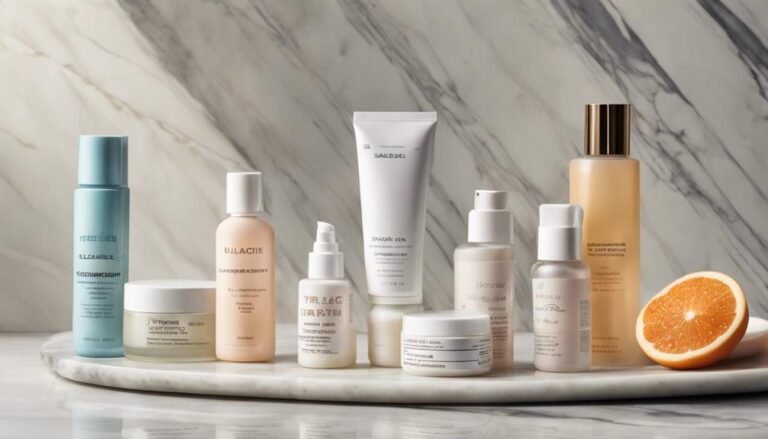The Importance of Hydration for Healthy Skin
Have you ever noticed how your skin feels dull and lackluster after a long day without much water intake? The impact of hydration on your skin goes beyond just quenching your thirst; it is the key to maintaining a healthy and glowing complexion. But how exactly does hydration influence your skin's health and appearance? Let's explore the fascinating connection between hydration and your skin's vitality, revealing essential insights that could transform your skincare routine.
Key Takeaways
- Hydration maintains skin suppleness, elasticity, and resilience.
- Dehydration leads to dry, flaky skin and impacts the skin's barrier function.
- Water transports nutrients, removes waste, and supports optimal skin function.
- Adequate moisturization promotes plump, smooth, and radiant skin.
- Hyaluronic acid locks in moisture, while gentle skincare practices are crucial for hydration.
Importance of Hydration
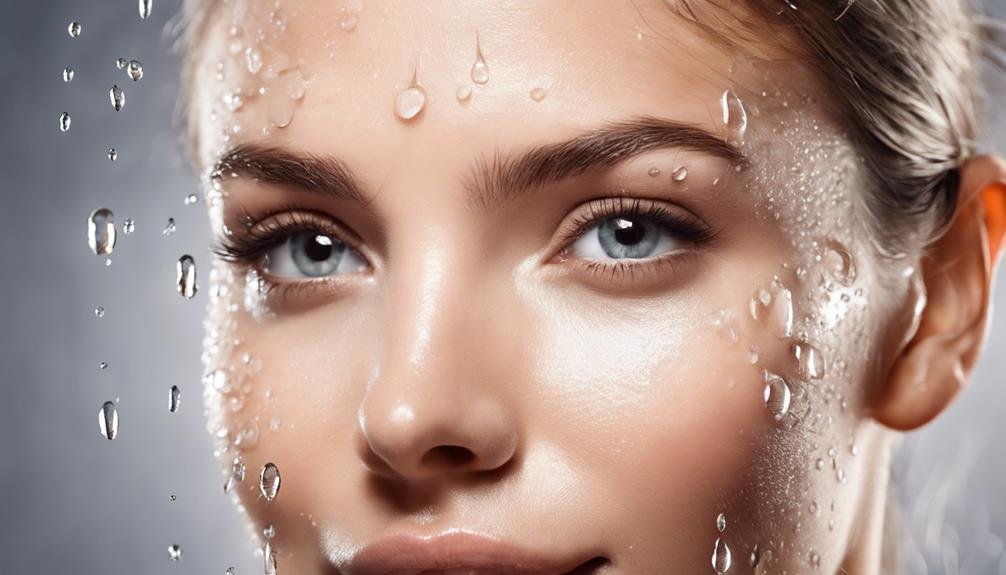
Hydration is a crucial element in maintaining healthy skin. Your skin is the largest organ in your body and plays a vital role in protecting you from external factors. Proper hydration ensures that your skin remains supple, elastic, and resilient. When you're dehydrated, your skin can become dry, flaky, and more prone to wrinkling and damage.
Water is essential for the functioning of your skin cells. It helps transport nutrients to the cells and removes waste products, promoting overall skin health. Additionally, adequate hydration supports the skin's natural barrier function, preventing moisture loss and protecting against irritants and pollutants.
Dehydration can lead to a dull complexion and exacerbate skin conditions such as eczema and psoriasis. To maintain healthy skin, it's important to drink enough water throughout the day and use hydrating skincare products.
Skin Hydration Basics
Ensuring your skin remains adequately moisturized is fundamental for maintaining a healthy complexion. Skin hydration basics involve understanding the importance of water for your skin's health. Your skin is the largest organ in your body and requires hydration to function optimally. When your skin lacks moisture, it can lead to dryness, irritation, and even exacerbate skin conditions like eczema. Hydrated skin appears plumper, smoother, and more radiant.
To keep your skin well-hydrated, it's essential to drink an adequate amount of water daily. Additionally, using moisturizers with ingredients like hyaluronic acid, glycerin, and ceramides can help lock in moisture and improve your skin's hydration levels. Avoiding long, hot showers and harsh soaps that can strip your skin of its natural oils is also crucial for maintaining skin hydration.
Hydration and Skin Health
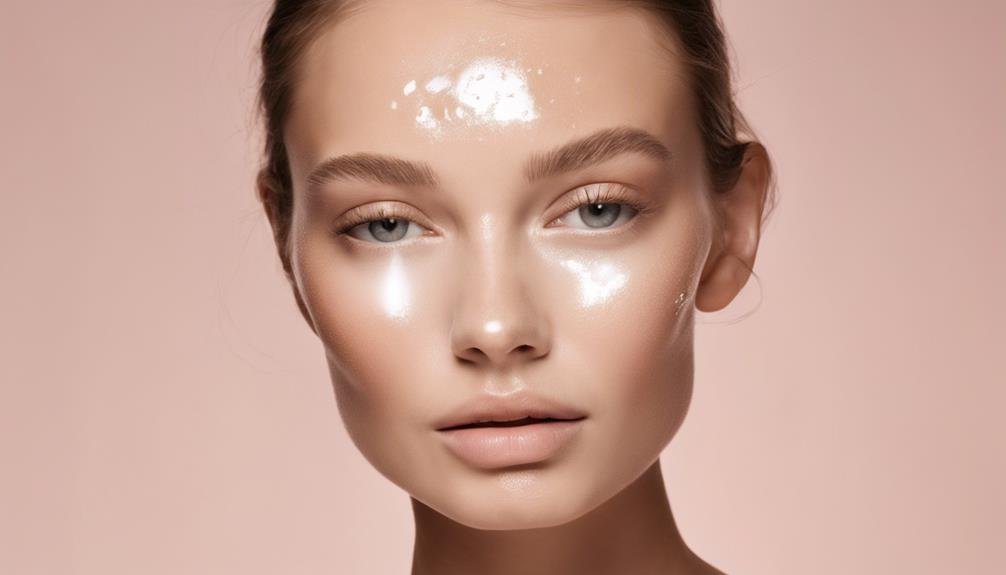
To maintain optimal skin health, it's crucial to understand the significant impact hydration has on your skin's overall well-being. Proper hydration plays a vital role in enhancing the appearance and function of your skin, influencing its elasticity, texture, and radiance.
- Moisture Barrier Support: Adequate hydration helps strengthen your skin's natural barrier function, protecting it from environmental stressors and preventing moisture loss.
- Enhanced Skin Elasticity: Well-hydrated skin tends to be more supple and elastic, reducing the likelihood of fine lines and wrinkles.
- Improved Skin Tone: Hydration promotes a more even skin tone by supporting cell turnover and preventing dullness.
- Reduction of Skin Conditions: Maintaining proper hydration levels can help alleviate common skin issues such as dryness, irritation, and inflammation.
Benefits of Hydration
Achieving optimal hydration levels is essential for maintaining healthy skin. Hydration benefits go beyond just quenching your skin's thirst; it plays a crucial role in ensuring your skin functions at its best. Let's explore the advantages of keeping your skin well-hydrated:
| Benefits of Hydration | Description |
|---|---|
| Enhanced Elasticity | Proper hydration helps maintain skin elasticity, reducing the appearance of fine lines and wrinkles. |
| Improved Texture | Hydrated skin feels smoother and softer, enhancing the overall texture and complexion. |
| Protection Barrier | Adequate hydration strengthens the skin's protective barrier, shielding it from environmental stressors. |
| Radiant Glow | Well-hoisted skin reflects light better, giving you a natural, healthy glow. |
These benefits highlight why hydration is more than just a skincare trend; it's a fundamental aspect of maintaining healthy and vibrant skin. By prioritizing hydration, you are investing in the long-term health and appearance of your skin.
Hydration for Radiant Skin
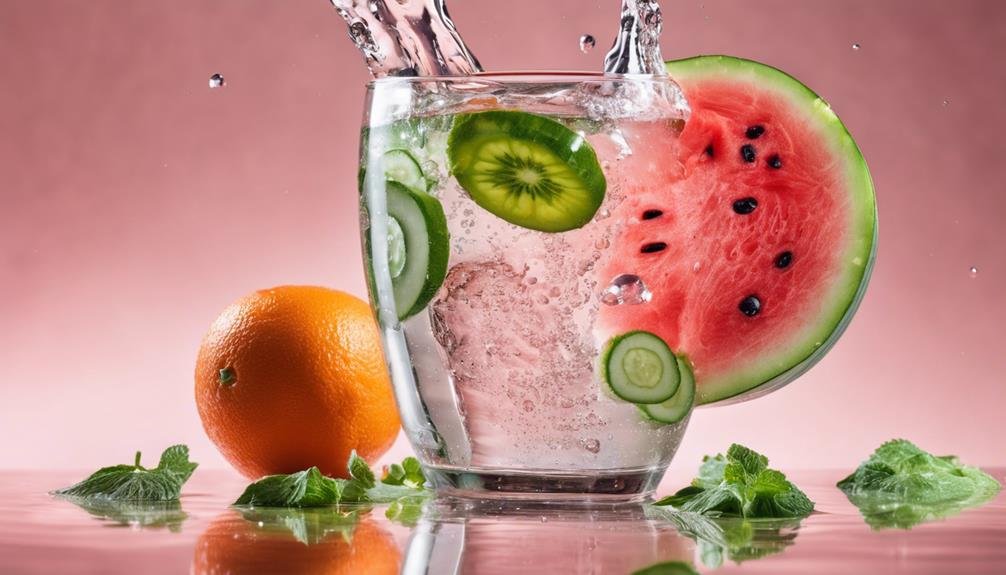
Proper hydration is a key factor in achieving radiant skin. Hydrated skin appears plump, smooth, and glowing, reflecting light beautifully. To enhance your skin's radiance, consider the following:
- Boost Elasticity: Adequate hydration maintains your skin's elasticity, helping it look firm and supple.
- Enhance Clarity: Hydration promotes skin cell turnover, revealing a clearer complexion and diminishing dullness.
- Reduce Fine Lines: Well-hydrated skin minimizes the appearance of fine lines and wrinkles, giving you a youthful look.
- Improve Tone: Hydration can even out your skin tone, reducing redness and discoloration, leading to a more even and vibrant complexion.
Hydration and Skin Aging
Maintaining adequate hydration levels isn't only crucial for achieving radiant skin but also plays a significant role in how your skin ages over time. Dehydrated skin can lead to increased fine lines, wrinkles, and sagging, accelerating the aging process.
When your skin lacks hydration, it becomes less elastic and resilient, making it more prone to developing visible signs of aging. Studies have shown that well-hydrated skin maintains its firmness and elasticity better, helping to reduce the appearance of wrinkles and maintaining a youthful glow.
By ensuring your skin is adequately hydrated, you can help slow down the aging process and maintain a more youthful appearance in the long run. Remember to drink plenty of water, use hydrating skincare products, and protect your skin from environmental factors that can contribute to dehydration and premature aging.
Taking these steps can help you achieve healthy, youthful-looking skin as you age.
Hydration and Skin Texture
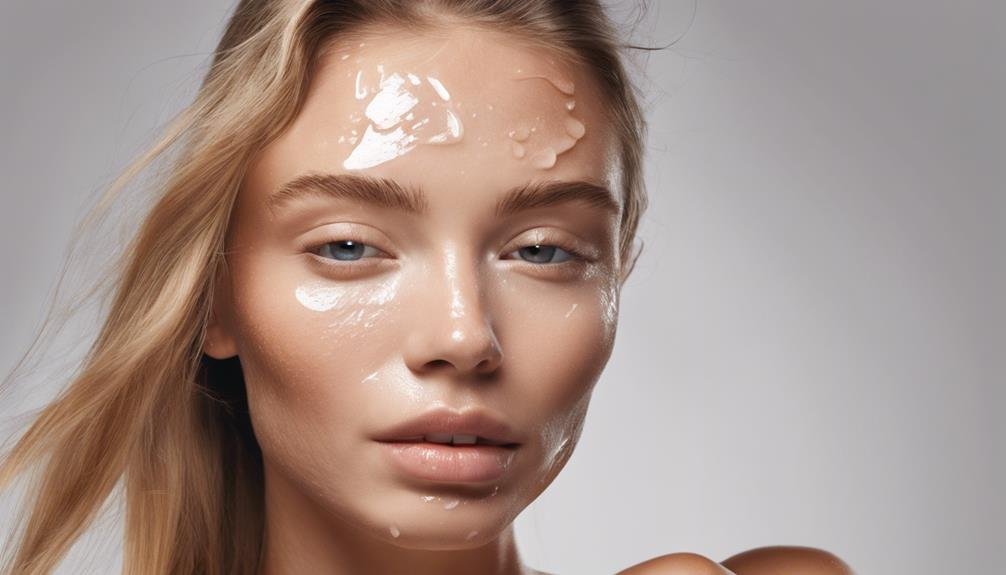
To enhance your understanding of skincare, it's essential to grasp the intricate relationship between hydration and skin texture. Proper hydration plays a crucial role in maintaining smooth and supple skin texture. Dehydrated skin can appear dull, rough, and uneven, highlighting the importance of adequate moisture levels for a healthy complexion.
- Hydration levels directly impact skin texture by influencing its elasticity and firmness.
- Well-hydrated skin has a smoother texture and a more youthful appearance.
- Lack of hydration can lead to dryness, flakiness, and an increase in the visibility of fine lines and wrinkles.
- Moisturizing regularly and ensuring adequate water intake are key factors in improving skin texture and maintaining a radiant complexion.
Hydration and Acne Prevention
Hydration is a fundamental factor not only in maintaining smooth skin texture but also in preventing acne breakouts. When your skin lacks proper hydration, it can lead to an overproduction of oil, which can clog pores and result in acne flare-ups. By ensuring you drink an adequate amount of water daily and use hydrating skincare products, you can help keep your skin balanced and reduce the likelihood of acne breakouts.
| Hydration Tips for Acne Prevention | Benefits |
|---|---|
| Drink plenty of water throughout the day | Helps flush out toxins and keep skin hydrated |
| Use oil-free moisturizers and hydrating serums | Prevents overproduction of oil |
| Opt for non-comedogenic skincare products | Reduces the risk of clogged pores |
| Include hydrating foods in your diet, such as fruits and vegetables | Supports overall skin health |
Hydration and Skin Elasticity
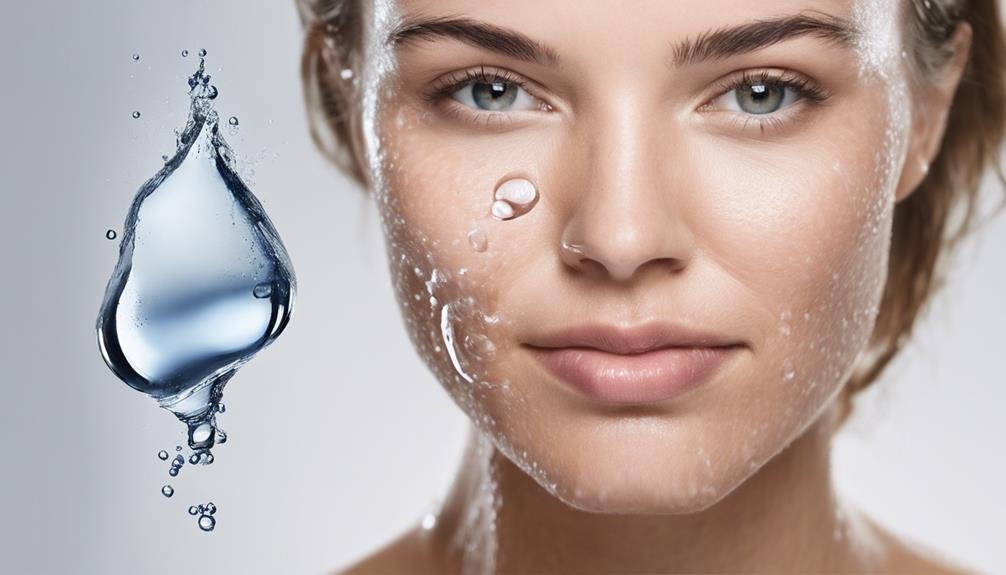
For optimal skin health, ensuring adequate hydration is essential to maintaining skin elasticity. Proper hydration plays a crucial role in preserving the elasticity of your skin, which is key to keeping it looking youthful and firm. Here are some key points to consider:
- Collagen Production: Hydration is vital for collagen synthesis, the protein responsible for skin strength and elasticity.
- Skin Plumpness: Well-hydrated skin appears plumper, reducing the appearance of fine lines and wrinkles.
- Elastic Fibers: Hydration supports the function of elastin fibers, which help your skin bounce back after being stretched.
- Skin Resilience: Adequate hydration promotes skin resilience, preventing sagging and maintaining a smooth texture.
Hydration and Skin Barrier
Maintaining a well-hydrated skin barrier is crucial for overall skin health. Your skin barrier acts as a protective shield, safeguarding you from external aggressors like pollutants and bacteria. When your skin barrier lacks hydration, it can become compromised, leading to issues such as dryness, irritation, and even inflammation.
Dehydrated skin barriers are more prone to damage, making it easier for irritants to penetrate and cause problems. By ensuring your skin barrier is adequately hydrated, you're fortifying its defenses and promoting healthier skin overall. Hydration helps to strengthen the skin barrier, allowing it to function optimally in retaining moisture and keeping harmful substances out.
Additionally, a well-hydrated skin barrier enhances the effectiveness of other skincare products you use, allowing them to penetrate better and work more efficiently. Therefore, incorporating proper hydration into your skincare routine is essential for maintaining a strong and resilient skin barrier.
Hydration and Skin Repair
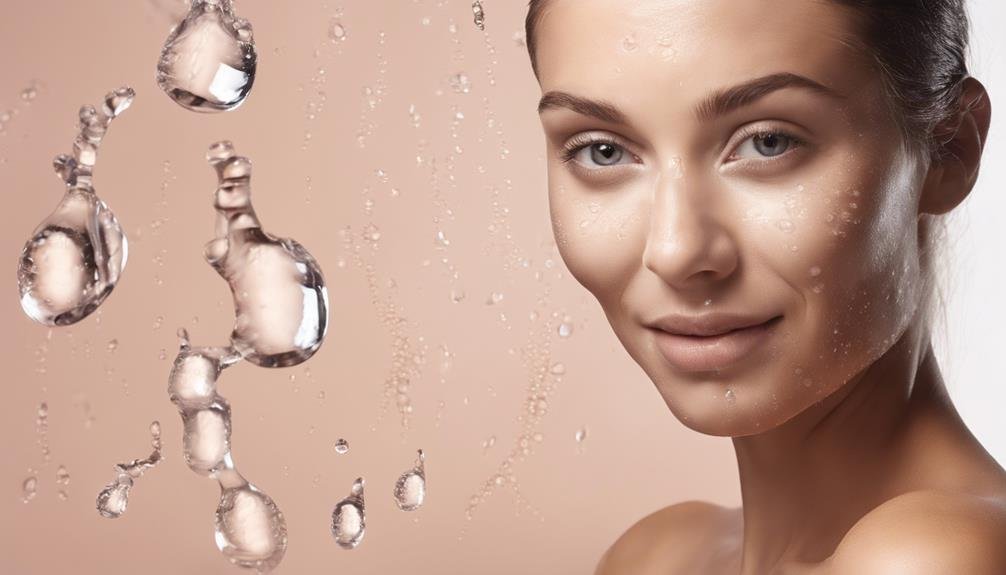
Wondering how hydration plays a crucial role in the skin's repair process? Proper hydration is essential for aiding the skin in its natural repair and rejuvenation mechanisms. When your skin is well-hydrated, it can more effectively heal and regenerate, resulting in a healthier complexion. Here's how hydration contributes to skin repair:
- Enhanced Cell Turnover: Adequate hydration supports the shedding of dead skin cells and promotes the growth of new, healthy cells.
- Improved Elasticity: Hydrated skin is more supple and elastic, allowing it to bounce back from damage more efficiently.
- Faster Wound Healing: Well-hydrated skin accelerates the healing of wounds, cuts, and other skin injuries.
- Reduced Inflammation: Hydration helps to calm and soothe irritated skin, reducing redness and inflammation.
Hydration Tips for Healthy Skin
Proper hydration is key to maintaining healthy skin and achieving a radiant complexion. To keep your skin hydrated and glowing, here are some essential tips to incorporate into your daily routine:
- Drink plenty of water throughout the day. Aim for at least 8 glasses, and more if you're active or in a dry environment.
- Use a moisturizer suitable for your skin type. Look for products with hyaluronic acid or glycerin to lock in moisture.
- Be mindful of your diet. Include hydrating foods like fruits, vegetables, and soups to nourish your skin from the inside out.
- Limit your intake of dehydrating beverages like alcohol and caffeinated drinks, as they can strip your skin of moisture.
- Invest in a humidifier to add moisture to the air, especially during dry seasons or in heated indoor spaces.
Frequently Asked Questions
Can Overhydration Cause Skin Problems?
Overhydration can potentially cause skin problems by disrupting the skin's natural balance. Excessive moisture may lead to issues like irritation, breakouts, or even skin infections. It's important to maintain a healthy level of hydration for optimal skin health.
How Much Water Is Too Much for Skin Hydration?
You should aim for around 8-10 glasses of water daily for optimal skin hydration. Remember, everyone's needs vary. Drinking too much water can lead to water intoxication, causing electrolyte imbalances and potential skin issues.
Does Drinking Water Hydrate the Skin Directly?
Drinking water directly hydrates your skin by improving its moisture levels from within. It helps maintain skin elasticity, plumpness, and overall health. Adequate hydration supports a radiant complexion and can reduce the appearance of fine lines and wrinkles.
Is There a Link Between Hydration and Skin Pigmentation?
Drinking water regularly can help maintain skin hydration, influencing skin pigmentation. Hydration supports skin health, aiding in an even skin tone and reducing the appearance of dark spots. It's essential to stay hydrated for radiant skin.
Can Certain Foods Dehydrate the Skin Despite Adequate Water Intake?
Yes, some foods can dehydrate your skin even with enough water intake. Salty snacks, alcohol, and caffeinated drinks can be culprits. To keep your skin hydrated, balance these items with plenty of water-rich fruits and veggies.
Conclusion
In conclusion, remember that when it comes to maintaining healthy skin, hydration is key. Just like a well-oiled machine, your skin needs proper moisture to function at its best. So, don't let your skin run dry – keep it hydrated to unlock its full potential and achieve that coveted healthy glow. Remember, a well-hydrated skin is like a well-tended garden, flourishing with vitality and radiance. Keep your skin hydrated for a youthful and vibrant complexion.






